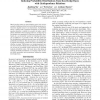Free Online Productivity Tools
i2Speak
i2Symbol
i2OCR
iTex2Img
iWeb2Print
iWeb2Shot
i2Type
iPdf2Split
iPdf2Merge
i2Bopomofo
i2Arabic
i2Style
i2Image
i2PDF
iLatex2Rtf
Sci2ools
106
click to vote
AAAI
2010
2010
Inducing Probability Distributions from Knowledge Bases with (In)dependence Relations
When merging belief sets from different agents, the result is normally a consistent belief set in which the inconsistency between the original sources is not represented. As probability theory is widely used to represent uncertainty, an interesting question therefore is whether it is possible to induce a probability distribution when merging belief sets. To this end, we first propose two approaches to inducing a probability distribution on a set of possible worlds, by extending the principle of indifference on possible worlds. We then study how the (in)dependence relations between atoms can influence the probability distribution. We also propose a set of properties to regulate the merging of belief sets when a probability distribution is output. Furthermore, our merging operators satisfy the well known Konieczny and Pino-P
Related Content
| Added | 06 Dec 2010 |
| Updated | 06 Dec 2010 |
| Type | Conference |
| Year | 2010 |
| Where | AAAI |
| Authors | Jianbing Ma, Weiru Liu, Anthony Hunter |
Comments (0)

